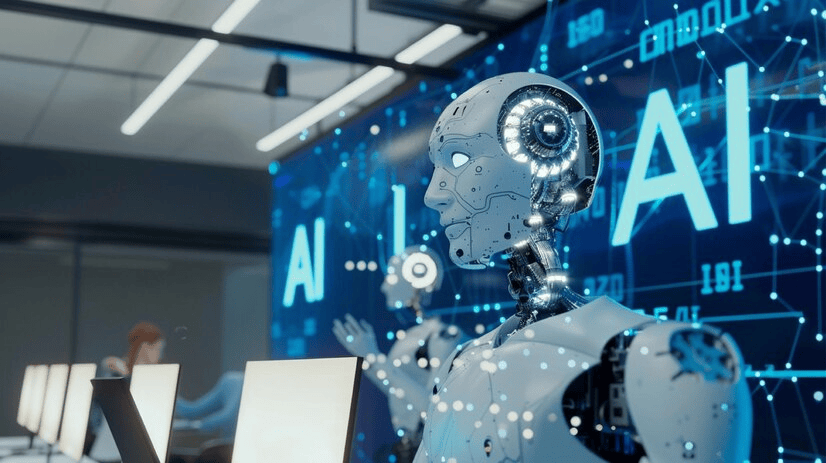The development of automation is now mostly dependent on artificial intelligence (AI), which has a significant influence on how many sectors function. Combining AI algorithms with automation technologies to increase productivity, decrease human error, and streamline procedures is known as AI-powered automation. Consequently, it is changing the nature of employment in the future, increasing productivity in a number of industries, and creating new growth prospects.
Comprehending Automation Driven by AI:
Fundamentally, AI-powered automation uses data analytics, machine learning, and natural language processing to streamline repetitive and time-consuming processes. In traditional automation, machines were programmed to carry out certain duties. By allowing systems to learn from data, make judgments, and adjust to new knowledge without continual human interaction, artificial intelligence (AI) goes beyond this. Businesses may now function more intelligently thanks to this transition, effectively responding to real-time data and changing with the market.
Principal Advantages of Automation Driven by AI:
- Enhanced Productivity and Efficiency: The ability to increase productivity by automating repetitive operations is one of its most notable benefits. It allows workers to focus on more intricate and creative tasks by automating customer service replies and controlling inventories in warehouses. Artificial intelligence (AI) systems can monitor machinery, forecast maintenance requirements, and even modify production schedules to satisfy demand in sectors like manufacturing, greatly lowering downtime and boosting output.
- Cutting Expenses: Implementing automation driven by AI can result in significant cost reductions. Operational costs are reduced by reducing the requirement for human supervision and intervention. AI, for example, may optimize delivery routes in industries like logistics, lowering fuel usage and transportation costs. AI systems can also uncover inefficiencies and provide cost-cutting strategies by analyzing data more quickly and correctly than human counterparts.
- Enhanced Precision and Quality Assurance: Any manual procedure will inevitably contain human mistakes, but AI-powered solutions can almost completely eliminate it. AI-driven diagnostic technologies are assisting healthcare workers in more accurately diagnosing illnesses. Similar to this, AI-powered robots in the manufacturing industry can carry out exacting operations that call for close attention to detail, producing better products and producing less waste.
- Improved Decision Making: Automation driven by AI has transformed decision-making in a variety of sectors. Artificial intelligence (AI) systems can handle enormous volumes of data and instantly produce insights that are useful. Artificial intelligence (AI) algorithms, for instance, can examine market trends and assist financial organizations in making well-informed investment decisions. AI in retail has the ability to forecast client behavior, which helps businesses tailor their products and raise customer satisfaction.
Uses In Industry:
Artificial intelligence (AI)-driven automation is being adopted by many industries and is revolutionizing how companies function. Among the noteworthy instances are:
- Healthcare: By improving patient management, treatment plans, and diagnostics, AI is transforming the healthcare industry. Automation driven by AI improves patient outcomes by assisting with administrative duties, medical imaging analysis, and individualized therapy.
- Manufacturing: AI-powered robots are replacing hazardous and repetitive jobs in the manufacturing sector, increasing production line efficiency and safety. By predicting when machinery would need repairs, AI-powered predictive maintenance systems also minimize downtime.
- Finance: Automation driven by AI is simplifying banking processes, from loan approvals to fraud detection. Compared to conventional techniques, AI algorithms can evaluate credit ratings and transaction histories to approve loans more quickly and precisely.
- Retail: AI is being used by retailers to customize consumer experiences. Artificial intelligence (AI) systems examine consumer data to forecast buying trends, provide product recommendations, and enhance inventory control, guaranteeing that the appropriate goods are offered when they’re needed.
Future:
With AI technology continuing to push the envelope of what is feasible, the future of automation powered by AI is bright. AI systems will be able to manage increasingly complicated jobs as machine learning models advance, which will further lessen the need for human interaction in daily chores. But there are also worries about job displacement as AI-powered automation becomes more widely used. The creativity, critical thinking, and emotional intelligence of humans cannot be completely replaced by AI systems, even though they are excellent at automating monotonous activities. It is predicted to change the nature of employment, generating new positions that concentrate on managing AI systems, data analysis, and strategic decision-making, rather than making jobs redundant.
To sum up, AI-powered automation is revolutionizing industries through improved decision-making, cost reduction, and increased efficiency. It is a tremendous instrument that could change how companies function and provide services in the years to come. In addition to simplifying operations, the use of AI into automation processes is creating new opportunities for development and innovation.

